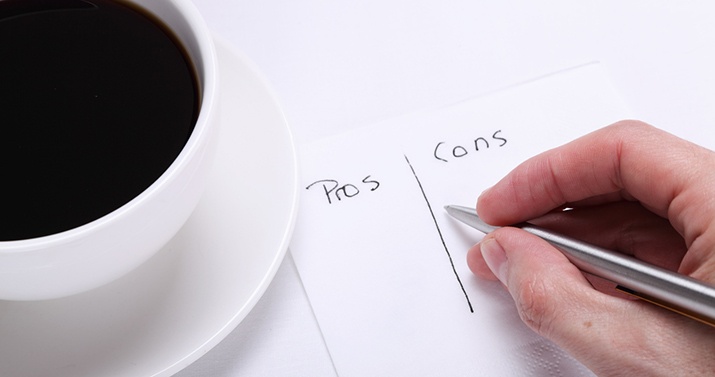
Prepaying on your Mortgage: Pros and Cons to Early Payoff
Determining whether to pay off your mortgage or invest those extra funds is a huge decision. There are some definitive pros and cons to paying off your mortgage early. With your mortgage paid off you could be debt free in retirement, but that could also mean you forego potential returns on the stock market. We’ve put together a list of the top reasons you should pay off your mortgage early, as well as some of the reasons you might want to keep the original loan payoff date.
Pro: You’ll carry less debt into retirement.
The Consumer Financial Protection Bureau (CFPB) estimates that 30% of homeowners who are 65 and over enter their retirement with mortgage debt. When you’re living on a fixed income, it can be difficult to allocate those funds towards a large mortgage payment each month. If your home is paid off, then you have greater flexibility in your monthly budget during retirement. Keep in mind that you would still be responsible for other house-related costs like property taxes, regular maintenance, and insurance.
Con: A large amount of your net worth will be tied up in your home.
Real estate is not as liquid as other investments, like stocks. If you need access to cash quickly, it’s much easier to liquidate investments in the stock market than your own home. The only way to leverage your home is to take out a home equity loan, or sell.
Pro: You’ll pay less in total interest on your mortgage.
You could potentially save thousands of dollars in interest if you pay your mortgage off early. Take a look at the math.
Situation One
- $200,000 owed
- 20 years left
- 4% interest rate
With monthly payments of $1,211.96, you would pay off the mortgage in 20 years – spending a grand total of $290,870.56. That’s $90,870.56 just in interest.
Situation Two
- $200,000 owed
- Pay off in 10 years
- 4% interest rate
With monthly payments of $2,024.90, you could pay off the mortgage in 10 years instead of 20. This would bring your total up to $242,988.33. That’s $42,988.33 in interest – but also $47,882.23 less than the previous situation. It’s incredible how much you could save by paying the mortgage off 10 years early, but you will be paying more each month. Your monthly payment rises by $812.94 a month. This may not be feasible for everyone.
Con: There may be penalties for prepayment.
Some mortgage terms and conditions stipulate penalties if you pay the loan off earlier than the agreed-upon date. Before you decide to make extra payments, talk to the loan expert at the financial institution who granted your mortgage to determine if there is any penalty.
Pro: You could free up funds for other projects.
Not being strapped with an over a $1,000 a month bill will create room for you to use that money on separate projects. Is your child attending college? That extra room in the budget could go towards tuition payments. You could also use the extra money for home renovations, saving for your dream vacation, or even adding to your investments.
Con: You could earn a higher return in other investments.
If you’re diverting money from other investments to pay off your mortgage early, some experts think it’s an unwise decision. Historically there are better returns when you play the stock market rather than investing in a home. However, higher returns mean higher risks. The stock market is much riskier in the short-term than a home, so only you can know which direction you feel comfortable putting your money on.
Pro: You can enjoy the psychological benefits of being debt-free.
Your psychological health can dramatically change for the better once you pay off your debt. Benefits include:
- Better mental health. According to research from the University of Nottingham, those who struggle with debt are more likely to suffer from mental health issues like anxiety or depression.
- Better physical health. The stress that comes from carrying debt is linked to migraines, obesity, accelerated aging, and even heart disease. Eliminating this stress is literally taking a weight off your body.
Con: You lose income tax deductions at tax time.
The amount you pay in interest on your mortgage can be deducted from your reported income tax when you file a return. If you no longer have any payments, you can no longer make those deductions. You need to weigh the importance of having that itemized tax deduction for your financial situation.
The Final Verdict
There’s no one size fits all recommendation. We can’t definitively tell you whether to pay off your mortgage or invest because it all depends on your unique financial situation. If you do decide to put extra money towards your mortgage, just make sure you put your money towards these items first.
- An emergency fund equal to 3-6 months of bills
- Paying off high-interest debt like credit cards
- Retirement savings like an employer 401K with company matches
Do you have your mortgage paid off? Let us know in the comments!
Be Debt-Free in Retirement
If you want to pay off your mortgage early, but think it isn’t possible – think again. We’ve developed a specialized program for people just like you. It’s the Home Stretch Final Mortgage, and it can help you be mortgage free in time for retirement. Learn more about the program here.

-2.png?width=300&height=65&name=AFCU-logo-2019-white-sm%20(1)-2.png)